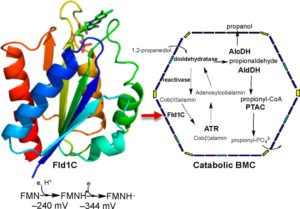
X-ray structure of a BMC-associated flavoprotein, Fld1C, which can participate in an electron transfer reaction.
Engineering artificial nanofactories modeled on bacterial microcompartments (BMCs) will require a chain of “logistical” vehicles to transport the products. Making progress on that front, scientists affiliated with Berkeley Lab’s Molecular Biophysics and Integrated Bioimaging Division and the MSU-DOE Plant Research Laboratory have detailed the structure and function of a BMC-associated protein involved in electron transfer, a fundamental part of the assembly line that leads to the production of chemical compounds. The study, published in the journal Biochemistry, was led by Cheryl Kerfeld; Marcus Sutter also collaborated on the project. Read more from the MSU-DOE Plant Research Lab.




